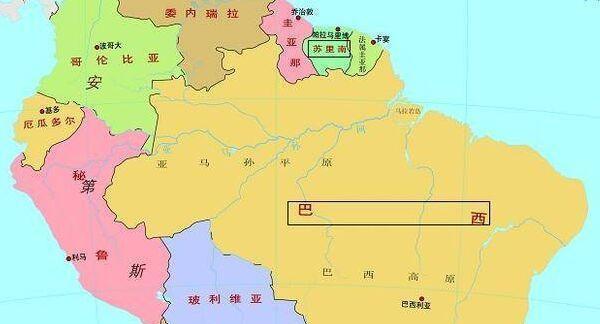Brazil is a country with a very high sense of existence in today's world, and it is also the country with the largest area, the most developed economy and the most powerful military in South America, with the reputation of brics, football kingdoms and so on.
Historically a Portuguese colony, Brazil did not develop at an impressive pace until the end of World War II, becoming a country with a high sense of existence today. In fact, Brazil has been glorious since modern times, once established a little-known "Brazilian Empire", which was a fairly rich and powerful country at that time.

Brazil's location in South America
In the early 19th century, the French Empire was born, the founding emperor Napoleon I continued to launch wars of conquest, when the rest of Europe except Britain and Russia, the rest of the country either became French territory or became a French vassal, and Portugal ruled by the Braganza dynasty became French territory in 1808 AD.
The whole country was occupied, and the Braganza dynasty was not willing to accept the fall of Portugal, so the entire royal family fled to the overseas colony of Brazil, and moved the capital Lisbon to Rio de Janeiro. In the past, Portugal adopted a high-pressure policy towards colonial Brazil, which seriously hindered the social development of Brazil, and after the Braganza dynasty fled to Brazil, it changed its previous policy and vigorously developed Brazil, so that Brazil developed rapidly and gradually became a state.
In 1815, the French Empire was completely destroyed, and the whole of Europe returned to the pre-war order, and João VI, the king of the Braganza dynasty in Brazil, led the entire royal family back to Portugal, leaving only his son Prince Pedro and grandson Pedro to stay in Brazil, and all policies towards Brazil remained unchanged.
Prince Pedro of the Braganza dynasty of Portugal
The reason why King João VI of Portugal let Prince Pedro and Pedro's grandson stay in Brazil was to avoid colonial Brazil from leaning toward independence due to social development, but João VI may not have dreamed that the people who fought for Brazil's independence were the father and son of Prince Pedro and King Pedro.
In the years that followed, Brazilians believed that Brazil had developed and had the capital to fight for national independence, so the independence movement broke out continuously, led by a native Brazilian politician Silva, who had a deep friendship with Prince Pedro as early as the braganza dynasty's escape to Brazil, so Silva fought for national independence and was supported by Prince Pedro, who was supposed to suppress him.
In this way, the whole of Brazil set off an independence movement, and Portugal, far away in Europe, received news that it had stripped Pedro of the royal status of the father and son, and sent an army to expedition to Brazil, only to be defeated and repulsed by the bitter Brazilians.
Brazilian independence movement
In 1822 AD, Prince Pedro and Silva believed that the time was ripe to declare Brazil officially independent, on the question of what kind of political system to implement, the Brazilians finally decided to implement a monarchy after consultation, the name of the country was "Brazilian Empire", with The Portuguese Prince Pedro as the emperor, and his son Pedro the Portuguese King Pedro as the Crown Prince, so the 24-year-old Portuguese Prince Pedro became the founding emperor of the Brazilian Empire, called "Pedro I", one of the youngest founding monarchs in the history of the world.
In this way, the first and only monarchical state in the history of Brazil, the Brazilian Empire, was born, which was a new country, because of the rapid development of the previous period, so the Brazilian Empire was quite rich and strong, and at that time the entire modern world was a rich and powerful country that could be ranked.
After Pedro I established the Brazilian Empire, with the assistance of Prime Minister Silva, the Brazilian Empire was further developed. In 1825 AD, the Portuguese expedition to the Brazilian Empire was a complete failure, and it was necessary to recognize the independence of Brazil, and Brazil gained true national independence. In 1828, João VI died, and the wise Pedro I, supported by both the Brazilians and the Portuguese, succeeded to the throne of the Bragança dynasty as King of Portugal.
Pedro I ascended the throne as emperor and established the Brazilian Empire
In 1831, Pedro I returned to Portugal and left the throne to his 6-year-old son, Crown Prince Pedro II, and Silva continued to assist in the administration of the country as prime minister. In 1834, at the age of 36, Pedro I died in Portugal and was succeeded by his younger brother Miguel I to the throne of the Braganza dynasty.
In the subsequent history, the Brazilian Empire existed as a rich and powerful country, but because Brazilians were influenced by republican ideas, activities against the monarchy continued to erupt. Until 1889 AD, the 64-year-old Pedro II abdicated under the pressure of the army marshal Fonseca, so that the Brazilian Empire, which had only been in place for 67 years, collapsed, the monarchy was abolished, the republic was implemented, and Brazil became a republic.
The above is the little-known Brazilian Empire in the history of Brazil, founded in 1822 AD, the founding emperor was prince Pedro I of the Braganza dynasty of Portugal, died in 1889 AD, the fallen emperor was Pedro II, the son of Pedro I, who experienced two generations of emperors, and the state was only 67 years old.
In order to commemorate the great contribution of Pedro I to the history of Brazil, later Brazilians have a statue of Pedro I in Brasilia, the capital of today's Brazil.
Statue of Pedro I, founding emperor of the Brazilian Empire